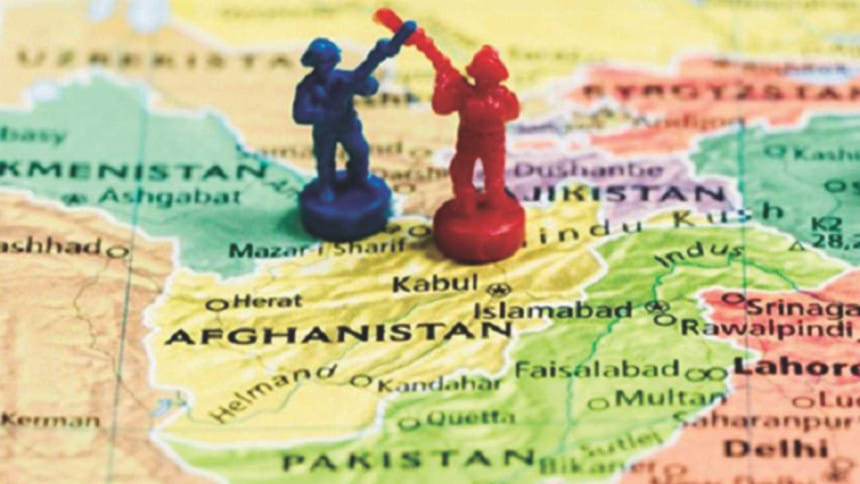Afghanistan and the New Great Game

The security situation in Afghanistan is getting worse by the day. Almost every week there are terrorist attacks on government installations or civilians with large number of casualties. As the civil war continues and number of deaths rise, Western and regional stakeholders are deeply worried and realigning themselves in Afghanistan.
The casualty figures in 2017 so far are indeed quite worrying. The United Nations Assistance Mission in Afghanistan (UNAMA) report released in April 25, 2017 disclosed that in the first quarter of 2017 (Jan-Mar) it documented 2,181 civilian casualties — 715 dead and 1,466 injured. In another report compiled by the Institute for Conflict Management (ICM) at least 240 civilians have been killed in Afghanistan between April 1 and June 9, 2017. The Special Inspector General for Afghanistan Reconstruction (SIGAR) released figures that between January 1, 2017 and February 24, 2017 at least 804 of the Afghan National Defense Security Forces (ANDSF) were killed and 1,328 wounded.
Besieged and exasperated Afghan President Ashraf Ghani said at least 20 different international terrorist groups were operating inside the country. The most prominent but opposing groups are the Afghan Taliban and the Islamic State. The Islamic State Khorasan Province (ISKP) welcomed disgruntled Taliban fighters in its ranks and have become a dangerous force.
ISKP emerged simultaneously as US forces began withdrawing from Afghanistan in 2015. It has drastically changed the strategic landscape and war dynamics in Afghanistan as regional alliances began shifting. What is baffling is that ISKP and Taliban are contesting to gain control of territory. The Afghan government controlled over 71 percent of territory in January 2016. It now controls only 60 percent of the territory. The "contested areas" increased from 23 percent in January 2016 to 29 percent in February 2017. While Taliban-controlled areas are scattered, the ISKP is in control of areas in northern Afghanistan.
The Taliban's declared political agenda is to drive out all foreign troops and regain state power it lost following US invasion in 2001. It does not have any ambitions beyond Afghanistan. But ISKP is trying to expand its fundamentalist contagion in Central Asia and the South Asian region.
Pakistan's ISI created the Taliban and has used it to destabilise the "unfriendly" governments in Kabul. Pakistan, having deep strategic interest in Afghanistan, always played a double game with Kabul through its influence over the Taliban. But now Pakistan is faced with a bigger enemy — the Islamic State.
Afghanistan-Pakistan-India relations are an extremely complicated narrative. India has always tried to reach Afghanistan over the head of Pakistan and develop close strategic relations with Kabul. In May 2017, Delhi offered USD 1 billion to Kabul as economic assistance. However, India is the only major power that does not have any communication channel with the Taliban or ISKP.
Tentative US attempts to contact the Taliban in the past have not produced any positive results. Even after 16 years of Operation Enduring Freedom there is no peace in sight. Despite all the tall talk President Donald Trump has not come out with a strategy on resolving the Afghan conflict. At a Senate hearing on June 13, 2017 US Defence Secretary James Mattis said, "We are not winning in Afghanistan right now." US Commander General John Nicholson described the situation in an Orwellian phrase, "The war in Afghanistan is at a 'stalemate'." Trump however, authorised Mattis to increase the level of troops and US is sending additional 4,000 troops to break the stalemate.
Russia, after being ousted from the country in 1988, has developed links with the Taliban. Moscow has always called Taliban a terrorist organisation and supported the Northern Alliance. But now with the presence of ISIL, Russia has changed its position, primarily because it does not want Central Asian Republics to come under the influence of ISKP extremism. Russia is said to be supplying arms to the Taliban. One wonders whether these are to undermine US mission in Afghanistan or to contain ISKP. Evidently, Moscow does not want to lose out in case the Taliban capture Kabul.
Though (Shiite) Iran supports the Ashraf Ghani government, it has also developed clandestine links over the past few years with the Taliban. The presence of (Sunni) ISKP on its borders is bad news for Tehran. Besides, Iran has always opposed US presence in Afghanistan, but since the Taliban fights US forces it is only natural that Tehran would maintain links with the Taliban.
China while assisting Kabul in fighting terrorism has maintained links with the Taliban. China certainly does not want ISKP's fundamentalism spreading to the Xinjiang province bordering Afghanistan. China wants to help resolve the conflict as it has invested billions of dollars in Afghanistan and Pakistan.
Saudi Arabia which has been deeply involved in Afghanistan maintains dual tracks — supporting President Ashraf Ghani and funding the Taliban.
The National Unity Government with two heads — President Ashraf Ghani and CEO Abdullah Abdullah — has made it weak, ineffective and corrupt. Taliban has persistently refused to talk to the Ghani government. The economy is in a poor state. The country has been plagued by large-scale looting of mineral resources by all the major powers involved in Afghanistan. This mineral looting, amounting to hundreds of millions of dollars per year, denying royalties to the government and illegal drug trade have created widespread corruption, entrenched warlords and have encouraged Taliban to grow stronger.
All the powers know that there is no military solution to this conflict. Peace will not come to Afghanistan as long as the stakeholders pull Afghanistan in different directions. The fear is with major powers playing the Great Game and Taliban and ISKP growing stronger, will Afghanistan become another Syria?
The writer is former Ambassador and Secretary.

 For all latest news, follow The Daily Star's Google News channel.
For all latest news, follow The Daily Star's Google News channel. 








Comments